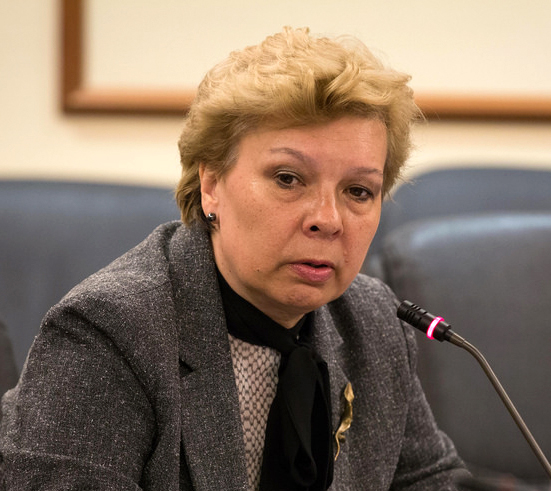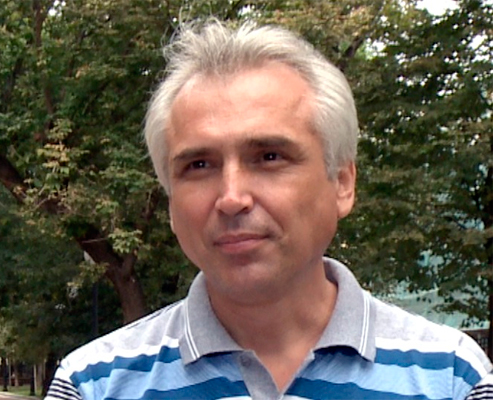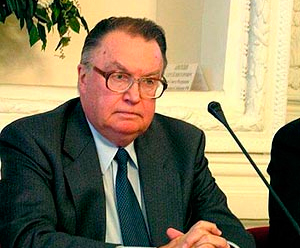The crisis in Ukraine definitively marks a new stage in Russia-EU relations. What type of changes in the approaches of key EU countries towards Russia are on the horizon as well as what are the prospects for further developing the energy dialogue between Moscow and Brussels? We discussed the situation with Elena Ananyeva, RAS Institute for European Studies; Igor Kovalyov, Higher School of Economics; and Yuri Fokin, Diplomatic Academy of Russian Foreign Ministry.
The crisis in Ukraine definitively marks a new stage in Russia-EU relations. What type of changes in the approaches of key EU countries towards Russia are on the horizon as well as what are the prospects for further developing the energy dialogue between Moscow and Brussels? We discussed the situation with Elena Ananyeva, Head of Center for British Studies at RAS Institute for European Studies and a member of the Editorial Board of the International Affairs magazine; Igor Kovalyov, Deputy Head of Chair for World Economy at the Department of World Economy and World Politics at the Higher School of Economics; and Yuri Fokin, Advisor to the Rector of the Diplomatic Academy of Russian Foreign Ministry and former Russian Ambassador to the United Kingdom.
EU countries such as France, Germany and Britain seem to be increasingly diverging in their approaches to domestic and foreign policy. Which of these states are more and which are less disposed towards Russia? And how will this affect the future of the situation in Ukraine?
Elena Ananyeva:
The differences between elite opinion in Berlin and the other countries are obvious since businesses do not want harsher sanctions and even the population does not desire an aggravation of relations with Russia.
France is concerned about the contracts for two Mistral helicopter carriers. Frictions have emerged between London and Paris. With the decision to sanction Russia and even step up the pressure "depending on Moscow's behavior" seemingly in place, both the French and the British will get hurt. Prime Minister David Cameron has recently said that UK is ready to somewhat forgo its economic interests only if other EU countries share the burden of the economic damage, hinting at the future Mistral deliveries to Russia. The deal is worth billions of euros, which means that the cancelled contracts would inflict a huge economic loss on France. Certain fears also exist in Britain. Remember that British Petroleum CEO Bob Dudley mentioned they would continue doing business with Russia.
Hence, the political rhetoric toward Russia is very tough but economic measures are not exactly severe. At the same time, even their side effects could be meaningful since business is very sensitive to political changes. The consequences for Russia seem in the works from NATO, because Europe badly needs rearmament. But Europe's capacity to re-equip is uncertain. Due to troubled economies, the willingness for higher defense spending is low. Europeans tend to think they could buy everything without military action. So, we need to pay attention to the gap between rhetoric and actions.
Igor Kovalyov:
In view of the Ukraine crisis, more amicable approaches from West Europe are hardly likely. The United Kingdom is traditionally associated with the United States, with the two countries linked by a special relationship. Hence, London is projecting the attitudes of Washington, which is known to be antagonistic to Moscow, while at the same time remaining its key partner on Ukraine.
Germany and France are friendlier to Russia. They do oppose Russia and have condemned its attitude, but understand that hurtful sanctions are unfeasible. I don't mean those that have been imposed, but genuine economic sanctions. Should they be put into place, the Europeans will be the first to suffer, both with regards to energy supplies and the problems caused by close trade and economic ties, i.e. joint business ventures, shares in Russian corporations, etc. To this end, France and Germany are definitely more amicable toward Russia than Britain.
Yuri Fokin:
Quite right. There are differences between the member-states of major international organizations. France and Germany have positions of their own. Just note that their Russia rhetoric is very cautious. They want to block Russia, but can't afford to do so without damaging their national interests.
Any action implies a counteraction, and one should heed the consequences. Take the Baltic states. These countries are aware of their hydrocarbon dependence on Russia and prefer to shape their behavior within sensible limits.
I've just heard Prime Minister Medvedev speak at the government session. He sounded quite reasonable. Russia's partners may behave improperly, but the thing needed is a clear-headed assessment of the fallouts for them and for us.
What are the prospects for a Russia-EU energy dialogue in the current context of Ukraine?
Elena Ananyeva:
The situation appears similar to that after the Georgia-South Ossetia crisis. In those days, reducing Europe's energy dependence on Russia was also in the spotlight, but no action followed due to the absence of feasible alternatives.
On September 1, 2008, an extraordinary EU summit was to take place to punish Russia with sanctions for the Georgia-South Ossetia conflict because of the prevailing opinion that Russia had been the first to open fire. But later the Europeans shyly acknowledged that Georgia was to blame. No wonder Western media were quite reticent about this discovery. On the eve of the summit, then British Prime Minister Gordon Brown wrote an article insisting that Russia must be deprived of the energy noose around Europe's neck, but the EU chose to refrain from sanctioning Moscow. After Russia was hit hard by the October 2008 crisis, Mr. Brown withdrew European Commissioner for Trade Peter Mandelson, Mr. Blair's ally, from Brussels and appointed him as Secretary of State for Business. And Moscow turned to be his first foreign destination where he came to improve economic relations.
All of these actions were pragmatic. And, of course, notice the differences between words and actions. While NATO was enthusiastic to have re-acquired its purpose, the EU did not share in this elation.
Igor Kovalyov:
Despite the complications caused by the current crisis in Ukraine, both now and in the near future, Western Europe is really short of viable alternatives to Russian energy supplies. Although some countries, Germany for one, are successfully developing alternative energy sources, they can't afford to give up Russian gas. Other regions, including the United States, cannot offer sustainable options as well. Hence, the dialogue will have to go on, with its parties working to find agreement. As I see it, this scenario is absolutely inevitable.
Yuri Fokin:
Honestly, I can't see anything that would actually hurt Moscow. Russian gas is indispensible for Europe. So far, the U.S. is not able to offer alternative gas supplies despite its shale gas that is difficult to extract. Production implies huge investment. Europe and Ukraine are hooked on gas consumption. Hence they are not willing to shoot themselves in the foot. In general, energy cooperation is not likely to be damaged that much. Hopefully, it will just stumble but not heavily enough to have the hurt leg replaced with a wooden or metal limb. And I would also not push the idea of our righteousness and survivability. We are not that weak to be severely damaged.






